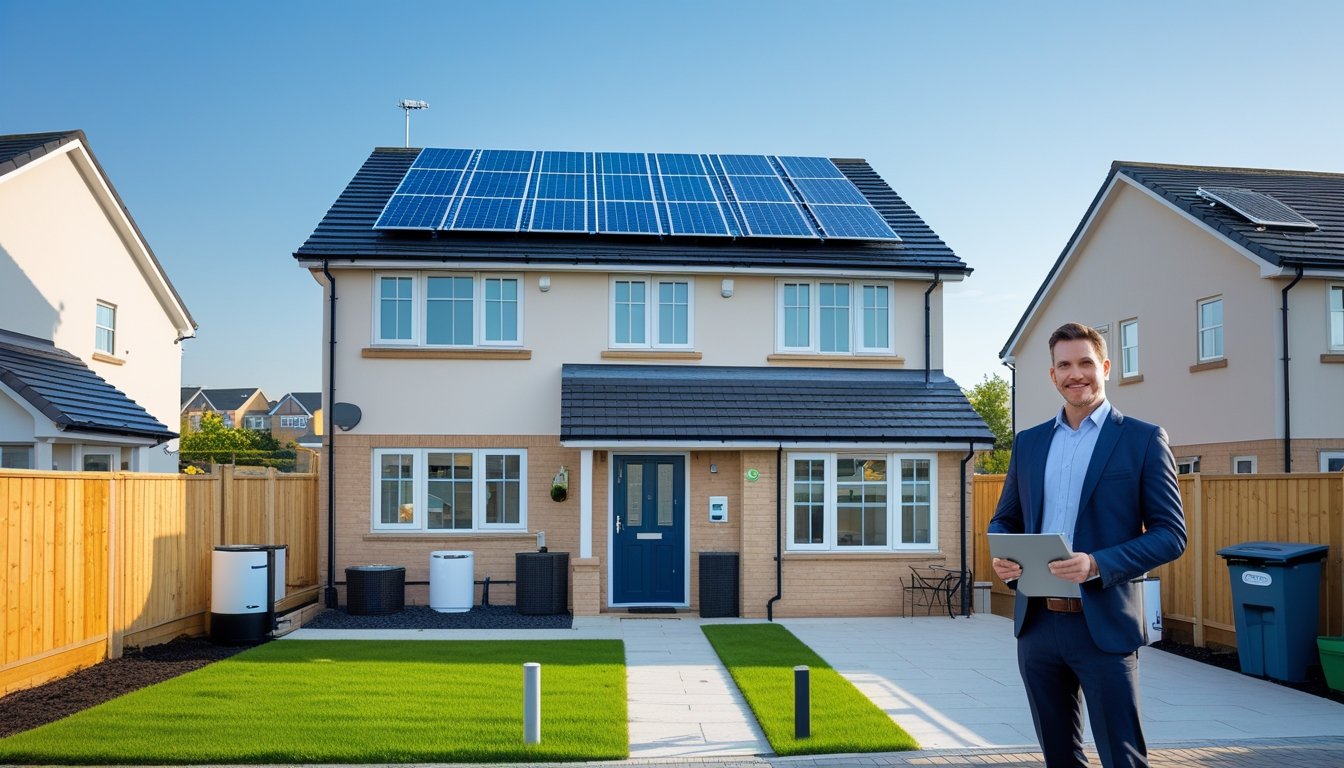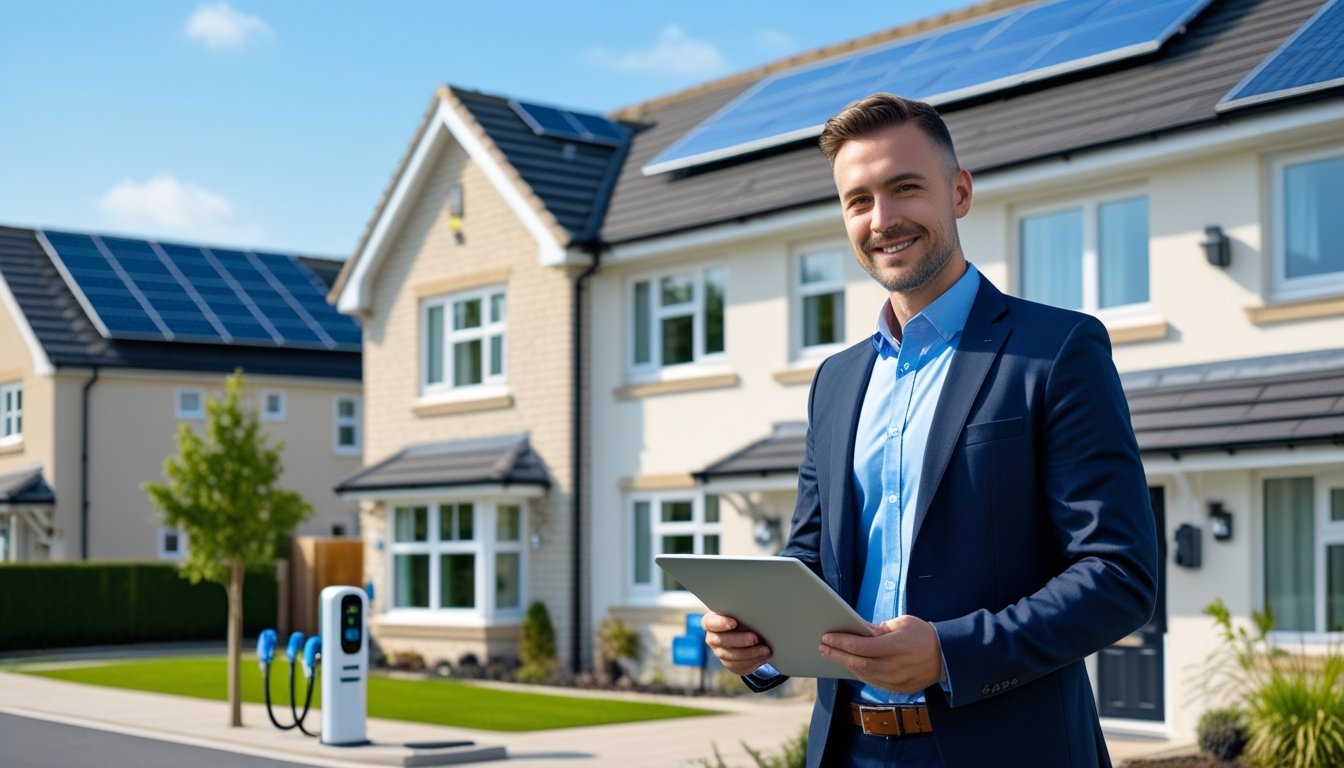Late updated: 19 Jun 2025 09:06
Written by: Eleanor Hartman
Energy-Efficient Home Upgrades For UK Landlords: A Guide to Sustainable Investments
Being a UK landlord comes with its own set of unique challenges and requirements, especially in today's growing focus on sustainability. Energy-efficient home upgrades not only offer compliance with the latest regulations but can also increase the value of rental properties. Enhancing energy efficiency is beneficial for landlords and tenants alike, as it can significantly reduce energy bills and impact positively on the environment.

The demand for energy-efficient rentals has been driven by enhanced regulatory frameworks and increasing awareness of sustainability. Landlords in the UK can achieve better Energy Performance Certificate (EPC) ratings by prioritising key upgrades such as insulation, double glazing, and efficient heating systems. There are financial incentives and support available to ease this transition, making it a feasible investment for property owners.
Understanding and implementing energy-efficient solutions can be a strategic move for landlords looking to elevate their properties in the competitive rental market. We will explore practical steps and the support available to ensure that our properties meet and exceed energy efficiency standards.
Key Takeaways
- Energy-efficient upgrades reduce energy bills and benefit the environment.
- Prioritising insulation and double glazing can improve EPC ratings.
- Financial support is available for landlords investing in energy efficiency.
Key Energy-Efficient Upgrades For UK Landlords
To meet new energy efficiency regulations, UK landlords should consider several key upgrades. These not only enhance comfort for tenants but also improve property value and reduce maintenance costs. By adopting these measures, landlords can effectively transition their properties into energy-efficient homes.
Insulation Methods
Proper insulation is essential to reducing energy consumption. Loft insulation and cavity wall insulation are two significant measures that help maintain consistent indoor temperatures. The Great British Insulation Scheme and the Energy Company Obligation offer grants to assist landlords in implementing these improvements. By investing in insulation, we can achieve substantial energy savings and enhance energy performance.
Heating System Upgrades
Modern heating systems can drastically cut energy use and emissions. Replacing old systems with efficient heating systems, like heat pumps, is a smart move. These systems utilise renewable energy sources to provide low-carbon heating. Warm Homes: Local Grants can help finance these heating upgrades, helping us transition towards renewable energy systems.
Windows And Glazing Enhancements
Double glazing significantly enhances a home's energy efficiency. This upgrade reduces heat loss and can also decrease external noise—a desirable feature for tenants. Enhanced windows and glazing foster a consistent indoor climate, improving energy performance without skyrocketing energy bills. Rental properties benefit immensely from these enhancements, increasing both energy efficiency improvements and property value.
Lighting, Appliances, And Smart Technologies
Upgrading to LED light bulbs and modern, energy-efficient appliances is another key improvement. These changes provide immediate energy savings and help in managing energy consumption effectively. Integrating smart technologies, like a smart meter, can lead to better energy management. It allows us to monitor energy usage in real-time, helping to optimise the efficiency of energy-efficient upgrades in our properties.
Regulations, Standards, And Financial Support For Energy-Efficient Rental Properties

Energy-efficient upgrades in UK rental properties are increasingly governed by strict regulations. We will explore the roles of Energy Performance Certificates, Minimum Energy Efficiency Standards, available grants, and the penalties for non-compliance.
Energy Performance Certificates And EPC Rating Requirements
Energy Performance Certificates (EPCs) play a critical role in setting benchmarks for property energy efficiency. The UK requires all privately rented homes to possess a valid EPC when marketed for sale or rent. Ratings range from A to G, with A being the most efficient. An EPC assessment by a certified domestic energy assessor provides insights into energy costs and reduced carbon emissions.
Meeting minimum EPC ratings is essential for landlords aiming to reduce tenants' utility bills and contribute towards net-zero goals. As of 2030, landlords must ensure an EPC rating of at least C. This requirement reflects UK Government efforts to lower carbon footprints and enhance the comfort of private tenants.
Minimum Energy Efficiency Standards And Legal Obligations
The Minimum Energy Efficiency Standards (MEES) legally bind landlords to specific EPC ratings. Since April 2018, private landlords can no longer let properties with an EPC rating below E to new or existing tenancies. These energy efficiency standards ensure houses contribute towards a sustainable future.
Failure to comply with the standards can result in significant financial penalties and restriction from leasing the property. Landlords must register any justifiable exemptions, such as impracticality of improvements, in the PRS Exemptions Register. Legal obligations reinforce the importance of professional contractors to achieve the requisite standards.
Government Grants And Funding Schemes
Various government funding schemes help landlords meet EPC requirements without bearing the full financial burden. The Warm Homes Grant and ECO4 offer substantial financial support for upgrading properties with D to G ratings. With grants reaching up to £15,000, landlords can implement energy-saving technologies that benefit tenants and property value alike.
The Green Homes Grant, although phased out, highlighted government's direction towards improved energy performance in homes. Access to financial support plays a vital role in reducing energy bills, aiding vulnerable tenants, and tackling fuel poverty.
Penalties For Non-Compliance And Enforcement
Non-compliance with energy efficiency regulations leads to financial penalties, ensuring landlords adhere to legal standards. To enforce these regulations, inspections and EPC assessments are crucial. Landlords face fines if their properties fall short of the MEES requirements, emphasizing the economic risks of neglecting legal obligations.
Authorities deploy fines to safeguard tenants' rights to energy-efficient homes, pressuring landlords to make necessary improvements. Ensuring compliance not only avoids penalties but also supports national targets for net-zero emissions by 2050.
Frequently Asked Questions

In the UK, landlords face evolving energy efficiency regulations and opportunities for grants. Understanding these changes is crucial to maintaining compliance and benefiting from available support programs.
What are the new EPC regulations for UK landlords in 2025?
By 2025, private rental properties in the UK must achieve an Energy Performance Certificate (EPC) rating of C or above to be legally rented. This change aims to improve energy efficiency and reduce carbon emissions.
How can landlords in the UK access energy efficiency grants?
There are multiple schemes available for landlords looking to enhance their properties' energy efficiency. The ECO4 scheme and the Home Upgrade Grant (HUG) scheme offer financial support for eligible energy improvements.
What will the minimum energy efficiency standards be for UK landlords after 2025?
Minimum standards will require landlords to achieve an EPC rating of C for newly rented properties and by 2028 for all existing rentals. These standards are part of the government's larger plans to reduce energy consumption and carbon output.
How is a home's energy efficiency rating determined for UK properties?
A property's energy efficiency is assessed through the EPC process, which evaluates several factors such as insulation, heating systems, and energy usage. A certified assessor provides the EPC rating, which ranges from A (most efficient) to G (least efficient).
Where can UK landlords find the official EPC register?
Landlords can access the official EPC register through the UK government's website. This platform allows them to view existing certificates and arrange for new assessments as needed.
What are the implications of the Energy Efficiency Regulations for UK landlords?
Landlords must ensure their properties meet updated energy standards to avoid legal penalties. Upgrading properties to better efficiency ratings can also result in reduced utility costs for tenants and make properties more attractive in the rental market.